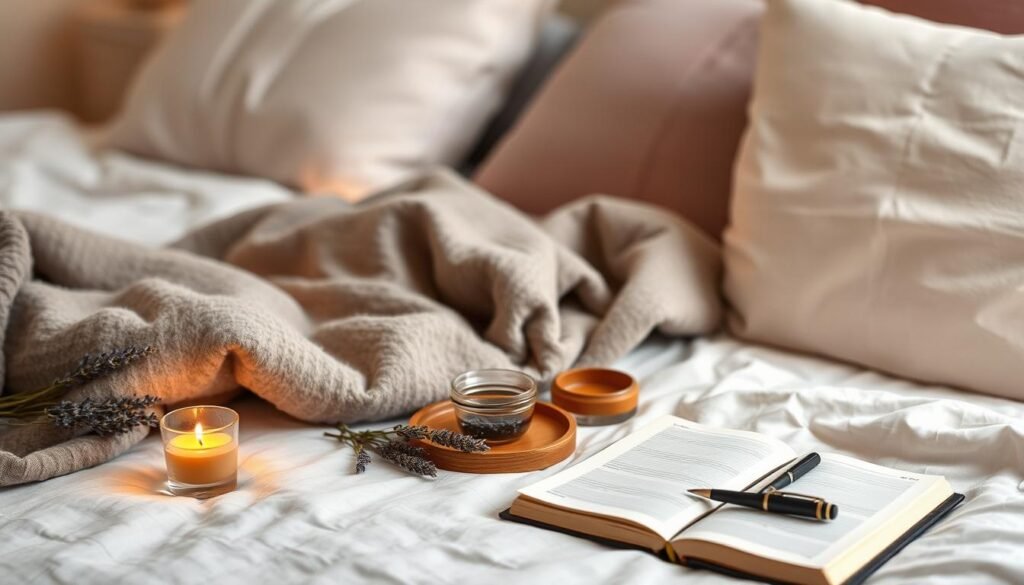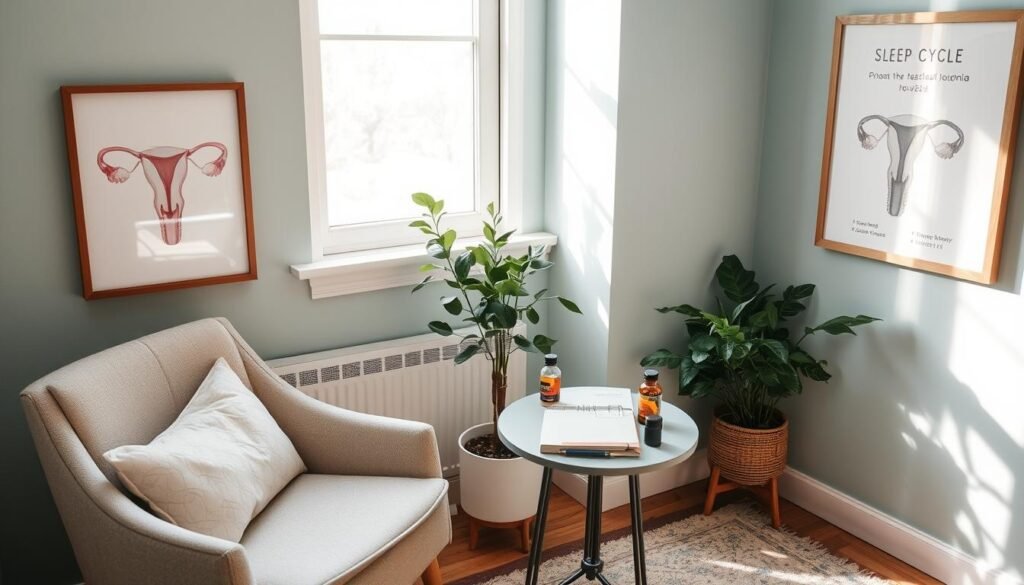Did you know women have a 40% higher chance of facing insomnia than men? This fact highlights a big health issue many women encounter, often during their menstrual cycle. Hormonal changes, especially in the luteal phase, cause many to struggle with sleep. They might find it hard to fall asleep, stay asleep, or feel well-rested. So, understanding menstrual insomnia is key to finding ways to manage it.
In this article, we’ll explore natural remedies and lifestyle tweaks to help those dealing with menstrual sleep problems. By looking at how hormonal shifts affect sleep, one can better handle these issues. This can lead to better sleep and overall health.
Key Takeaways
- Women are significantly more likely than men to experience insomnia linked to their menstrual cycles.
- Identifying the hormonal causes of sleep disturbances can lead to better management strategies.
- Natural remedies and lifestyle changes can aid in improving sleep quality.
- Creating a sleep-friendly environment is essential for overcoming menstrual insomnia.
- Tracking sleep patterns can help identify specific triggers affecting rest.
Understanding Menstrual Insomnia
Menstrual insomnia means trouble sleeping because of the menstrual cycle. It happens because of cramps, headaches, and hormone changes before periods. Hormone changes, especially in progesterone and estrogen, mess with how well you can sleep.
What is Menstrual Insomnia?
This problem makes it hard to fall asleep, stay asleep, or you might wake up too early. Research shows that up to 90% of people who have periods also have PMS. A few also have a severe type called PMDD. These issues lead to bad sleep and feeling really tired during the day before the period starts.
How Hormonal Changes Affect Sleep
Hormonal shifts are key in causing menstrual insomnia. The menstrual cycle is about 28 days, but this can vary. The week before your period, you make less melatonin, which helps you sleep. This makes sleeping well hard.
With PMDD, sleep changes include more deep sleep and less REM sleep. To fix sleep problems from PMS or PMDD, try lifestyle changes, relaxation, or sometimes medical help. A regular sleep routine and a calm sleeping area are really important.
| Factor | Impact on Sleep |
|---|---|
| Hormonal Fluctuations | Disrupted sleep patterns, lower melatonin levels |
| PMS/PMDD | Increased insomnia, worse sleep quality |
| Exercise | Improves sleep quality and reduces insomnia |
| Birth Control Pills | May enhance sleep stability |
| Sleep Hygiene | Helps mitigate impacts on sleep |
Causes of Menstrual Insomnia
Menstrual insomnia can seriously hurt your life. It’s key to know why insomnia happens, mainly when hormones change during your period. Issues like premenstrual syndrome (PMS) and premenstrual dysphoric disorder (PMDD) make sleep worse in the luteal phase. The hormone shifts before your period lead to sleeping troubles.
Hormonal Imbalances
The menstrual cycle brings big hormone shifts that change how you sleep. It can be hard to fall asleep or stay asleep before your period. Research shows people with PMS often have insomnia and poor sleep then. The mix-up of hormones, like progesterone and estrogen, messes with normal sleep, disturbing stage two and REM sleep.
Physical Symptoms of PMS and PMDD
Physical signs of PMS and PMDD also lead to insomnia. Cramps, bloating, headaches, and sore breasts make it uncomfortable to sleep at night. Feelings of upset, worry, and sadness make good sleep hard too. Up to 70% of women see their sleep change before their period, linking it to hormone changes. Knowing these physical and hormonal reasons might help those with menstrual insomnia. For more details, visit this source.
Recognizing the Symptoms
Understanding symptoms of menstrual insomnia is vital for many women. They experience trouble sleeping during their menstrual cycles. Knowing these signs can lead to help and better sleep. Common symptoms are:
Common Signs of Menstrual-Related Sleep Issues
- Difficulties in falling asleep or staying asleep
- Frequent awakenings during the night
- Waking up too early and feeling unrested
- Experiencing fatigue, irritability, and difficulty concentrating during the day
Many women find these issues get worse before their periods. This shows the link between hormone changes and sleep troubles. Insomnia occurs more among women near their period. If symptoms don’t improve, seeking professional help is key. It may point to conditions like PMDD or hormone problems.
When to Seek Professional Help
If a woman notices her sleep problems don’t get better, it’s time to see a doctor. Getting help early is crucial. This can provide support and ways to manage sleep issues. Cognitive Behavioral Therapy for Insomnia (CBT-I) is a recommended treatment. Getting help is important for better sleep and reducing PMS symptoms that impact life.
Managing Menstrual Insomnia Naturally
Finding ways to manage menstrual insomnia can improve well-being during the menstrual cycle. Many women try natural remedies and herbal supplements to sleep better. Understanding these options can lead to a more peaceful sleep.
Natural Remedies to Consider
Maintaining a regular sleep schedule is crucial. Creating a tranquil sleep environment is also important. Deep breathing or gentle stretching before bed can enhance sleep quality.
- Establishing a calming bedtime routine.
- Limiting screen time an hour before bed to reduce blue light exposure.
- Practicing mindfulness meditation to ease anxiety.
Herbal Supplements That May Aid Sleep
Several herbal supplements are popular for menstrual insomnia. Valerian root is calming, while ashwagandha fights stress. Passionflower has soothing effects. Other notable options include:
| Herbal Supplement | Benefits |
|---|---|
| Valerian Root | Promotes relaxation and improves sleep quality. |
| Ashwagandha | Reduces stress and improves well-being. |
| Passionflower | Eases anxiety and aids in sleep. |
| Ginkgo | May improve blood flow and lessen PMS symptoms. |
Using these herbal supplements can help lessen symptoms of menstrual insomnia along with healthy lifestyle choices.

The Impact of Sleep Hygiene
Good sleep hygiene is key for beating menstrual insomnia. Making your sleeping area cozy helps improve your sleep a lot. Make sure your bedroom is perfect for rest. Control the light, noise, and how warm or cool it is.
This will help make an ideal sleep setting. It encourages relaxation and deep sleep.
Creating a Sleep-Friendly Environment
Creating a space that’s good for sleep involves a few important things. These include:
- Darkness: Use blackout curtains to keep outside light away.
- Quiet: Playing soft music or using a white noise machine can block annoying noises.
- Temperature: A cooler room, around 60-67°F, is best for sleeping.
- Comfort: A supportive mattress and soft bedding are key for comfort.
Making these small changes can do a lot for your sleep hygiene. It helps create a peaceful environment that’s great for sleeping.
Establishing a Consistent Sleep Routine
It’s key to have a regular sleep schedule to sleep better. Try to sleep and wake up at the same time every day, even on weekends. This helps keep your body’s clock in check, making it easier to fall asleep and wake up.
Here are more tips:
- Limiting screen time: Cut down on device use an hour before bed. It protects your sleep cycle.
- Avoiding stimulants: Stay away from caffeine and nicotine before sleeping. These can keep you awake.
- Relaxation techniques: Calm activities like reading or gentle stretching prepare your body for rest.
These habits improve your sleep hygiene and set the stage for deeper, more refreshing sleep.
Dietary Recommendations for Better Sleep
What we eat deeply impacts how well we sleep. Adding foods for sleep quality to our diet means better sleep. Knowing which foods help and which ones to skip is key. Avoiding certain foods before bed is vital for good sleep habits.
Foods to Boost Sleep Quality
Some foods are proven to enhance sleep quality. They include:
- Fatty fish rich in omega-3 fatty acids
- Dairy products, including yogurt and cheese
- Fruits like kiwi, tart cherries, strawberries, and blueberries
- Whole grains such as oats and brown rice
- Poultry, specifically turkey and chicken
- Beans and legumes
Eating these foods for sleep quality boosts melatonin and supports restful nights. For example, kiwi eaten an hour before bed can improve sleep onset and quality.
Foods to Avoid Before Bedtime
Kicking certain foods out of your evening routine is crucial. Avoid these for better sleep:
- Heavy meals causing discomfort
- Caffeinated drinks like coffee, tea, and chocolate
- Alcohol, as it leads to broken sleep
- Saturated fats and sugars, disrupting sleep patterns
Having a regular eating schedule greatly improves sleep. Embracing good eating habits while avoiding the bad leads to restful nights.

Relaxation Techniques to Promote Sleep
Using effective relaxation techniques can really help you sleep better. Methods like mindfulness, meditation, and gentle stretching lower stress and get you ready for sleep. By focusing on the now, these practices help push distractions aside and bring peace.
Meditation and Mindfulness Practices
Meditation helps you sleep by calming your thoughts and reducing stress. Mindfulness keeps your mind in the present, letting go of worries. This makes for a peaceful sleep setting. Using deep breathing and imagining calm places also helps in relaxing.
Gentle Yoga and Stretching Exercises
Gentle yoga and stretching at night can boost your sleep. These activities reduce physical tension and help your body and mind relax. Yoga moves for sleep can decrease discomfort and increase calm feelings, enriching your night-time routine.
Lifestyle Changes that Support Sleep
Making meaningful lifestyle adjustments can greatly improve sleep quality. This is especially true for those suffering from menstrual insomnia. Focusing on regular exercise and managing stress effectively can enhance sleep and overall health.
Regular Physical Activity
Regular physical activity is key for better sleep. Studies show that exercising moderately for at least 150 minutes weekly can greatly lessen insomnia. People in these studies not only slept better but also had less anxiety and depression.
It’s best to exercise in the late afternoon or early evening. This timing matches our body’s natural rhythms, helping us sleep better.
Managing Stress and Anxiety Levels
Learning to manage stress is vital for good sleep. Engaging in therapy, writing in a journal, and enjoying mindful hobbies can lead to a calm mind. This calmness makes it easier to fall asleep.
Meditation is highly beneficial, too. By meditating regularly, individuals can enhance their sleep patterns. Reducing anxiety helps in preparing the mind for rest, promoting a relaxed state.
| Activity | Benefits | Recommended Duration |
|---|---|---|
| Moderate Exercise | Reduces insomnia, anxiety, and depression | 150 minutes per week |
| Meditation | Improves sleep patterns, reduces stress | 20 minutes daily |
| Journaling | Helps clear the mind and reduces anxiety | 10-15 minutes before bed |
Alternative Therapies for Menstrual Insomnia
Many people turn to alternative therapies for menstrual insomnia relief. Options like acupuncture and light therapy can help. They balance hormones and boost well-being.
Acupuncture as a Sleep Aid
Acupuncture is a top choice for battling menstrual insomnia. It targets body points to balance hormones and lower stress. People find that it not only improves sleep but also eases PMDD symptoms.
By providing relaxation, it helps foster better sleep habits. This makes acupuncture a useful tool.
Light Therapy and Its Benefits
Light therapy also stands out in managing sleep issues. It especially helps in maintaining our body’s sleep-wake cycle against menstrual cycle changes. Studies show it boosts mood and sleep during PMS or PMDD.
It’s simple and non-invasive, making it ideal for natural insomnia management.
Using these alternative methods can offer new ways to handle menstrual insomnia. Many benefit from combining acupuncture with light therapy for better sleep. For more on natural remedies, click here.
Consulting Healthcare Professionals
Many people with sleep problems during their menstrual cycle should talk to doctors. It’s important to know when to get help, especially if you suspect conditions like Premenstrual Dysphoric Disorder (PMDD) or hormonal imbalances.
Understanding When to See a Doctor
It’s crucial to know when to seek expert advice. If you have sleep issues for a few menstrual cycles or if these problems affect your day-to-day life, see a healthcare provider. Signs like ongoing mood changes, discomfort, and constant tiredness also mean you should visit a doctor.
Potential Medical Treatments and Solutions
Doctors may suggest different treatments based on your needs. Available options might include:
- Hormonal therapy to regulate sleep patterns affected by hormonal fluctuations.
- Prescription medications such as benzodiazepines and “Z-drugs” to help you sleep better.
- Over-the-counter medicines like antihistamines for short-term relief.
- Cognitive behavioral therapy for insomnia (CBT-I), which tackles sleep-related thoughts and actions.
Your treatment plan will be customized to your health needs. The goal is to get your sleep back to normal and boost your overall health.

Keeping a Sleep Diary
A sleep diary gives insight into your sleep habits. It records sleep quality and daily activities, including menstrual cycle phases. By tracking this info, you can identify what causes your insomnia.
Benefits of Tracking Your Sleep Patterns
A sleep diary has many uses. It lets you see your sleep patterns over time. This helps find the link between how well you sleep and your daily life. Doctors say to keep this diary for 7 to 14 days for a clear picture.
This diary is vital for seeing a doctor. It helps them make plans just for you. CBT-I, a treatment for insomnia, uses sleep journals too.
Identifying Triggers and Patterns
With a sleep diary, you can find what keeps you up. Noticing a link between stress and bad sleep can help. Studies show making to-do lists before bed helps people sleep faster.
Knowing what ruins your sleep lets you fix it. If you can’t sleep well most nights, see a doctor. They can help find the deep-seated reasons.
Conclusion
Managing menstrual insomnia naturally can improve sleep quality for many. Over 33% of women have sleep issues during their period. It’s vital to try natural solutions and sleep strategies.
Making lifestyle changes is key. Good sleep hygiene and dietary changes can help a lot. This can ease sleep-related problems during menstruation.
Hormonal changes greatly affect sleep during menstruation. They change neurotransmitter levels and sleep cycles. Natural remedies like Myo-inositol and Vitex could help with sleep issues.
Adding light exercise and stress management can also help. These practices make it easier to sleep well during your period.
Getting better sleep is doable if you take action. Sometimes, you might need advice from a professional. By understanding and using natural methods, you can handle menstrual insomnia.
This leads to better health and happiness.